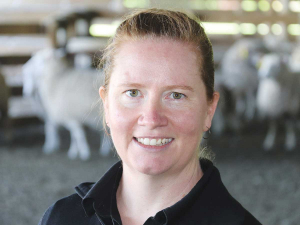The vagaries of the weather pose challenges for animals, as well as people. Work by Massey University researcher and senior lecturer in sheep production, Dr Rene Corner-Thomas, has come up with a novel way of how farmers can help their stock. Peter Burke reports...
Dr Corner-Thomas says sheep are highly intelligent when it comes to seeking shelter - be it in winter or in summer.
She says if it gets cold they seek the shelter of trees or other forms of protection and in summer they seek shade.
"Unfortunately, over the last 20 to 30 years the amount planting of trees and shrubs on farm has reduced," she told Rural News. "A lot of that is due to infrastructure, with things like pivot irrigation, but also there appears to be a general trend of removing shade and shelter from farms."
Corner-Thomas points out that providing shelter is part of the animal welfare codes for sheep and cattle and all livestock. But she dds that many farmers are still not doing this and her work has been directed at finding ways that are practical, cost effective and improve the welfare of animals.
She says there is a particular problem at lambing time when newly born lambs are susceptible to cold winds, which is a significant factor in lamb survivability. Corner-Thomas says research has shown that providing some form of shelter can improve lamb survivability by up to 10%.
"So, what we have come up with in the case of lambs is a very 'high-tech' solution in the form of straw bales. We have a paddock where we have but eight bales in a cross shape and that creates a little micro climate. This is only one bale high, but when you think of the size of a lamb, that is quite sufficient to provide the necessary shelter."
As part of the trial, they have put the bales in one paddock and none in the other, just to see what use the lambs make of their artificial shelter. She says, while they haven't done a detailed analysis of the data, their own observations suggest the sheep use the bales in different ways.
Corner-Thomas says in some cases the lambs play on the bales the same as they would if they were tree stumps in the paddock.
"In the Manawatū where the trials were conducted we also notice that lambs were often sleeping on top of the straw bales. This, we believe, is because it's been very we in the region with puddles in many paddocks - so the lambs were seeking a dry place to sleep."
Corner-Thomas explains that when they started the study they never anticipated that the lambs would utilise the straw bales in such a way, but says it goes to prove that, given options, sheep can make good choices.
She says during the lambing period the ewes will seek natural shelter, be it trees or stumps of trees to tuck their lambs away and keep them warm and dry. She adds, in some cases, ewes will look for big tufts of grass or reeds - anything to keep their offspring safe from the cold and wet.



















